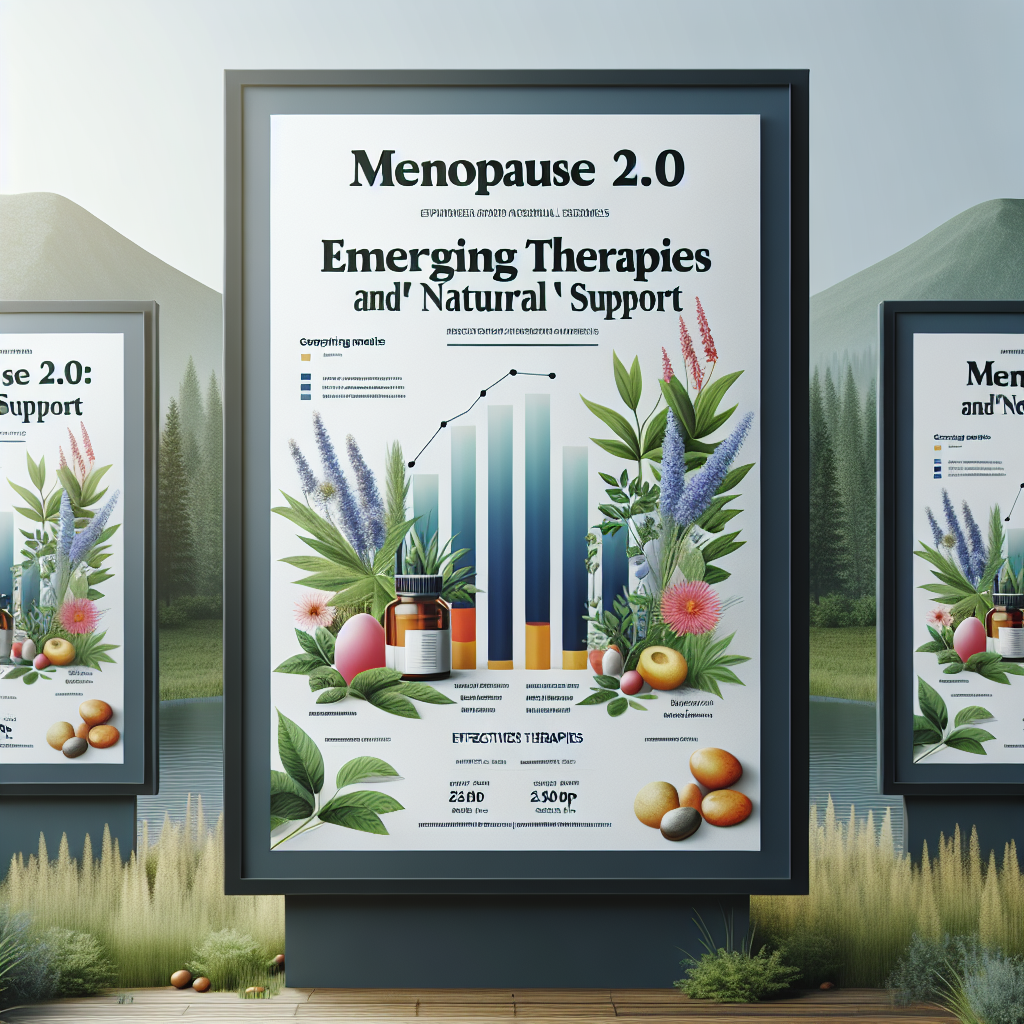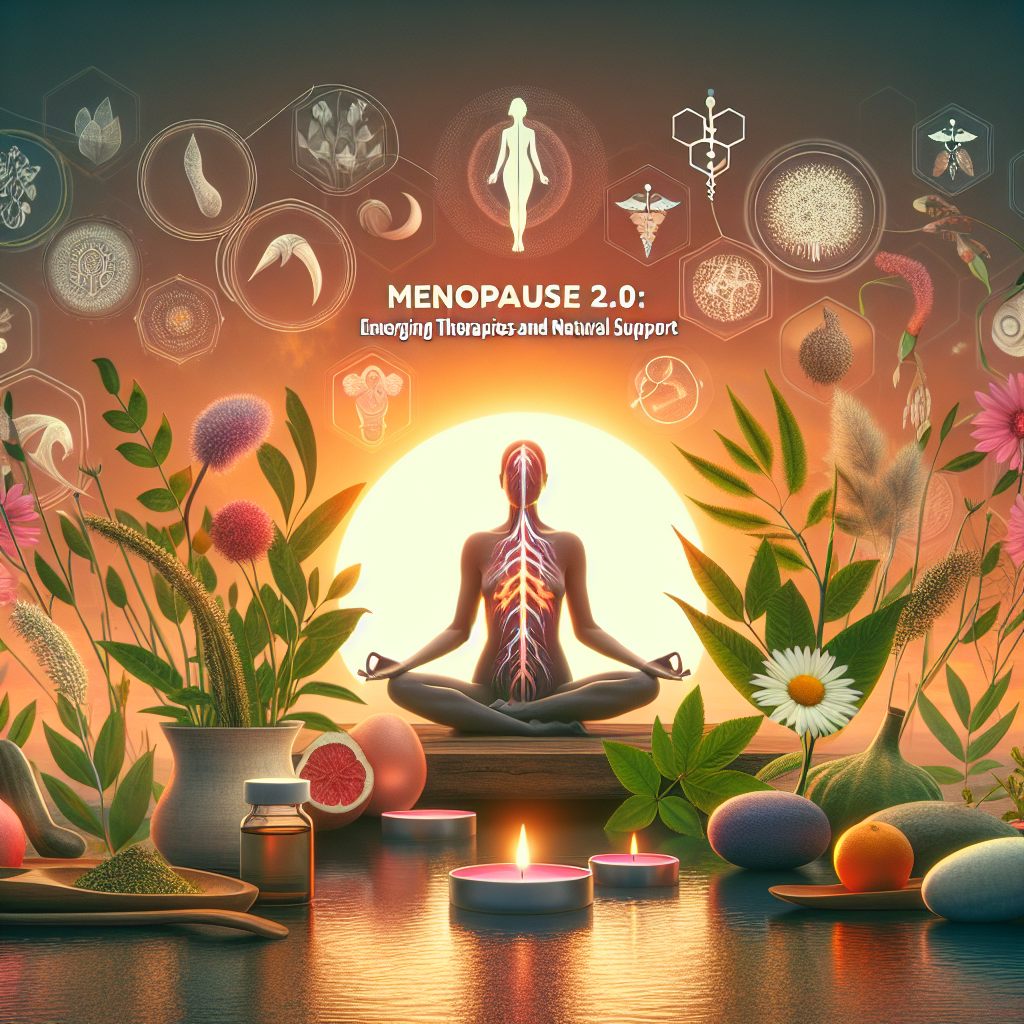Menopause 2.0: Emerging Therapies and Natural Support

Discover more about Menopause 2.0: Emerging Therapies and Natural Support. Learn how to navigate this natural phase of life with the latest treatments and holistic approaches. Visit My Vibrant Vitality today.
Exploring Menopause 2.0: A Look at Emerging Therapies
Menopause, a natural biological process that marks the end of a woman’s menstrual cycles, is often associated with a myriad of symptoms that can significantly impact a woman’s quality of life. These symptoms, which include hot flashes, night sweats, mood changes, and sleep disturbances, are primarily due to the decline in estrogen levels that occurs during this transition. Traditional hormone replacement therapy (HRT) has been the standard treatment for these symptoms, but it is not without its risks and side effects. As such, there is a growing interest in exploring new therapies and natural support for menopause, a concept we’ll refer to as Menopause 2.0.
Emerging therapies for menopause are focusing on targeting specific symptoms and improving overall well-being. One such therapy is the use of selective serotonin reuptake inhibitors (SSRIs) and serotonin and norepinephrine reuptake inhibitors (SNRIs). These medications, typically used to treat depression and anxiety, have been found to reduce the frequency and severity of hot flashes. Additionally, gabapentin, an anti-seizure medication, has also shown promise in managing hot flashes.
Another innovative approach is the use of non-hormonal therapies that target the body’s thermoregulatory system. A prime example is the FDA-approved drug Brisdelle, which contains a low-dose SSRI called paroxetine. It works by reducing the brain’s response to decreasing estrogen levels, thereby reducing the occurrence of hot flashes.
Moreover, the use of bioidentical hormones is gaining traction. These are hormones that are chemically identical to those produced by the body and are believed to carry fewer risks than traditional HRT. However, more research is needed to fully understand their safety and efficacy.
On the other hand, natural support for menopause is also gaining popularity as women seek safer, more holistic approaches to managing their symptoms. Lifestyle modifications, such as regular exercise, a balanced diet, and stress management techniques, can significantly improve menopausal symptoms. Regular physical activity, for instance, can help manage weight gain, improve sleep, and boost mood.
Nutritional support is another crucial aspect of natural menopause management. Consuming a diet rich in fruits, vegetables, lean proteins, and whole grains can help balance hormones and manage symptoms. Certain foods, such as soy and flaxseeds, are rich in phytoestrogens, plant-based compounds that mimic the effects of estrogen in the body and can help alleviate hot flashes and night sweats.
Herbal remedies are also being explored for their potential benefits. Black cohosh, for example, has been widely studied for its potential to reduce hot flashes and mood swings. Similarly, St. John’s wort is often used to manage mood changes associated with menopause.
In conclusion, Menopause 2.0 represents a shift towards more personalized and holistic approaches to managing menopause. Emerging therapies are focusing on targeting specific symptoms and improving overall well-being, while natural support emphasizes lifestyle modifications, nutritional support, and herbal remedies. As research continues to evolve, it is hoped that these new approaches will provide safer, more effective options for women navigating this significant life transition.
Natural Support for Menopause 2.0: A Comprehensive Guide

Menopause, a natural biological process, marks the end of a woman’s menstrual cycles. It is diagnosed after a woman has gone 12 months without a menstrual period. While menopause can occur in your 40s or 50s, the average age is 51 in the United States. This transition often comes with a host of symptoms, including hot flashes, night sweats, sleep problems, and mood changes. However, the advent of Menopause 2.0, a term coined to represent the new wave of therapies and natural support for menopause, is changing the narrative.
Emerging therapies for menopause are revolutionizing the way we approach this phase of a woman’s life. These therapies are designed to alleviate the symptoms of menopause, improve quality of life, and reduce the risk of long-term health issues associated with menopause, such as osteoporosis and heart disease. Hormone replacement therapy (HRT), for instance, is one of the most effective treatments for menopausal symptoms. It involves taking estrogen to replace the hormone that your ovaries no longer produce after menopause. However, HRT is not suitable for everyone and can have side effects.
In light of this, many women are turning to natural support for menopause. These natural remedies aim to provide relief from symptoms and improve overall health without the potential side effects of conventional treatments. They include lifestyle changes, dietary adjustments, and the use of natural supplements.
Lifestyle changes are a crucial part of natural support for menopause. Regular physical activity can help to alleviate symptoms such as mood swings and sleep problems. Exercise can also improve bone health, reducing the risk of osteoporosis. Additionally, stress management techniques such as yoga, meditation, and deep breathing exercises can help to manage hot flashes and improve sleep quality.
Dietary adjustments also play a significant role in managing menopause symptoms. A diet rich in fruits, vegetables, whole grains, lean proteins, and low-fat dairy products can help to maintain a healthy weight and reduce hot flashes. Foods rich in phytoestrogens, plant-based compounds that mimic the effects of estrogen in the body, can also help to balance hormones and alleviate symptoms. These include soy products, flaxseeds, and certain fruits and vegetables.
Natural supplements are another key component of natural support for menopause. Black cohosh, for instance, has been used for centuries to treat hot flashes and other menopause symptoms. Other supplements, such as St. John’s wort and ginseng, may help to alleviate mood changes and improve sleep.
In conclusion, Menopause 2.0 represents a new era of understanding and managing menopause. Emerging therapies offer effective treatment options, while natural support provides a holistic approach to managing symptoms and improving overall health. However, it’s important to remember that every woman’s experience with menopause is unique. What works for one woman may not work for another. Therefore, it’s crucial to consult with a healthcare provider before starting any new treatment or therapy. With the right support and guidance, menopause can be a time of positive change and renewed vitality.
The Future of Menopause Treatment: Unpacking Menopause 2.0
Menopause, a natural biological process that marks the end of a woman’s menstrual cycles, is often associated with a myriad of symptoms that can significantly impact a woman’s quality of life. These symptoms, which include hot flashes, night sweats, mood changes, and sleep problems, are typically managed through hormone replacement therapy (HRT). However, the future of menopause treatment is evolving, with emerging therapies and natural support options paving the way for Menopause 2.0.
The advent of Menopause 2.0 is characterized by a shift from the traditional hormone replacement therapy to more innovative and personalized treatments. This shift is driven by the growing understanding of the complex hormonal changes that occur during menopause and the realization that a one-size-fits-all approach may not be the most effective way to manage menopausal symptoms.
One of the most promising emerging therapies is bioidentical hormone replacement therapy (BHRT). Unlike traditional HRT, which uses synthetic hormones, BHRT uses hormones that are chemically identical to those produced by the body. This means that they are potentially more natural and safer than synthetic hormones. Moreover, BHRT can be tailored to meet the specific needs of each woman, making it a more personalized approach to menopause treatment.
Another emerging therapy is the use of selective estrogen receptor modulators (SERMs). These drugs work by selectively stimulating or inhibiting the effects of estrogen on different tissues in the body. This allows them to alleviate menopausal symptoms while minimizing the risks associated with estrogen therapy, such as breast cancer and cardiovascular disease.
In addition to these emerging therapies, there is also a growing interest in natural support options for managing menopausal symptoms. These include lifestyle changes, such as regular exercise and a healthy diet, which can help to mitigate some of the symptoms of menopause. For instance, studies have shown that women who engage in regular physical activity experience fewer hot flashes and have better sleep quality than those who are sedentary.
Dietary changes can also play a crucial role in managing menopausal symptoms. For example, consuming a diet rich in phytoestrogens, which are plant-based compounds that mimic the effects of estrogen in the body, can help to alleviate hot flashes and night sweats. Foods that are high in phytoestrogens include soy products, flaxseeds, and certain fruits and vegetables.
Moreover, there is a growing body of evidence supporting the use of certain herbs and supplements for menopause symptom relief. For instance, black cohosh, a plant native to North America, has been found to be effective in reducing hot flashes and night sweats. Similarly, St. John’s wort, a herb widely used for its antidepressant properties, can help to alleviate mood changes associated with menopause.
In conclusion, the future of menopause treatment is promising, with emerging therapies and natural support options offering a more personalized and holistic approach to managing menopausal symptoms. While further research is needed to fully understand the benefits and risks of these new treatments, they represent a significant step forward in the quest for a more effective and safer menopause management. Indeed, Menopause 2.0 is not just about treating symptoms; it’s about empowering women to take control of their health and wellbeing during this significant phase of life.